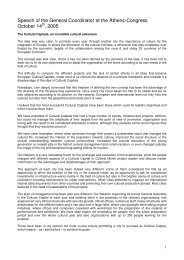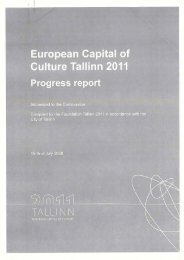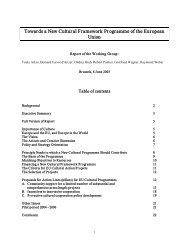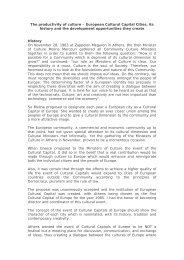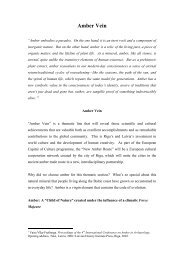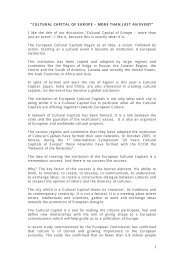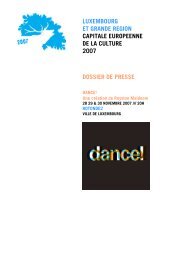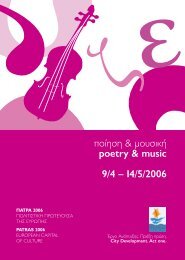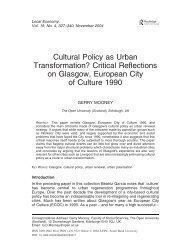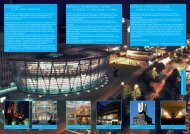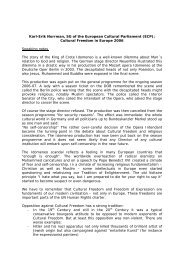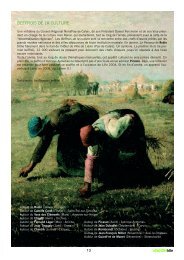Concise.pdf - Brugge Plus
Concise.pdf - Brugge Plus
Concise.pdf - Brugge Plus
- No tags were found...
You also want an ePaper? Increase the reach of your titles
YUMPU automatically turns print PDFs into web optimized ePapers that Google loves.
BRUGGE 2002 as an opportunity<br />
for (hotel-based) tourism<br />
64<br />
BRUGGE 2002<br />
Introduction<br />
In Bruges the limited space caused by a mediaeval street pattern combined with increasing<br />
visitor numbers every year is exercising ever greater pressure on the other urban functions<br />
and the quality of life. Back in 1990 a study prompted the city council to give shape to the<br />
tourist development within a core zone, the so-called “golden triangle”. That same study<br />
emphasised the advantages of a policy oriented towards hotel-based tourism for an improved<br />
quality of life and a greater economic added value. The policy indicated this recommendation<br />
as a top priority, but the implementation failed due to the lack of a genuine accompanying<br />
action programme.<br />
BRUGGE 2002 was to take up this thread again. It drew the card of hotel-based<br />
tourism, partly because this helps the participation in and experience of culture, partly<br />
because it was thereby underwriting a strategic choice that offered most guarantees<br />
in the long term for sustainable tourist development. BRUGGE 2002 has an immediate<br />
tourist multiplier effect, but it is also a pivotal moment for the perception of<br />
Bruges as a living cultural city and tourist draw after 2002. In the framework of<br />
BRUGGE 2002 targeted initiatives were started up to strengthen the image of Bruges<br />
as a city to stay in.<br />
The impact of BRUGGE 2002 on (hotel-based) tourism<br />
The city of Bruges, Toerisme Vlaanderen and BRUGGE 2002 commissioned the market<br />
research bureau WES to carry out an impact study on the BRUGGE 2002 event.<br />
This study is admittedly a snapshot in time, but it can put the place of this kind of<br />
large-scale culture project in a clearer perspective. It could possibly also be the forerunner<br />
of a tourist policy plan that should further outline the strategic path to be followed<br />
in the coming years.<br />
The WES study reports that during the cultural year Bruges received visits by<br />
3,050,000 day-trippers and 556,000 tourists staying in Bruges for more than a day<br />
for recreational purposes. The number of overnighting tourists is 9% up on 2001. It<br />
can be said that the impact of BRUGGE 2002 on the public can be termed sizeable: it<br />
emerged that 21% of overnighting tourists and 23% of day-trippers had been influenced<br />
by the activities of BRUGGE 2002 in their choice of Bruges as a destination.<br />
Total spending by the day-trippers and recreational<br />
overnighting tourists during the period of the<br />
cultural year is estimated at almost EUR 213 million.<br />
Based on the percentage of overnighting<br />
tourists and day-trippers that visited Bruges on<br />
account of BRUGGE 2002, the WES study concludes<br />
that the Cultural Capital generated a surplus<br />
of EUR 42 million at most in spending, with<br />
EUR 25 million accounted for by overnighting<br />
tourists and EUR 17 million by day-trippers. This<br />
is an increase of 25% at most. The expenditure<br />
surplus was chiefly to the benefit of restaurants<br />
and cafés (EUR 18 million), accommodation<br />
(EUR 10 million), small traders (EUR 8 million)<br />
and attractions (EUR 5 million).<br />
Michael Franti (Cactus Festival)



